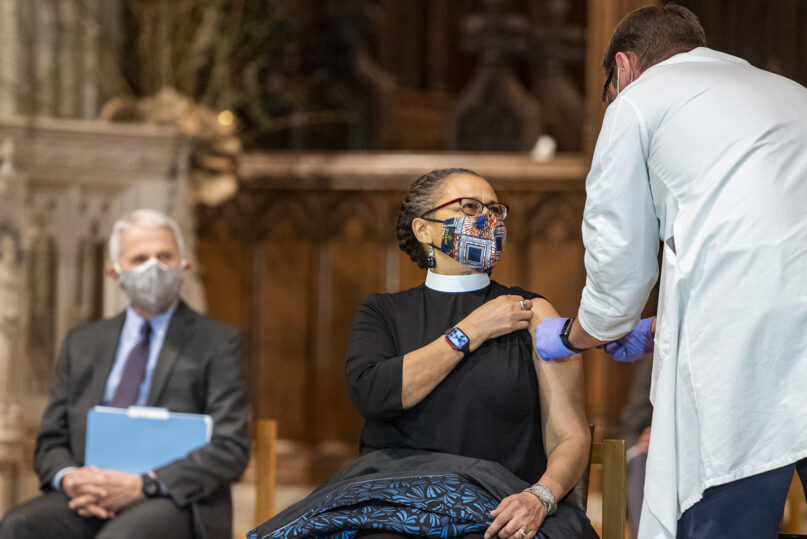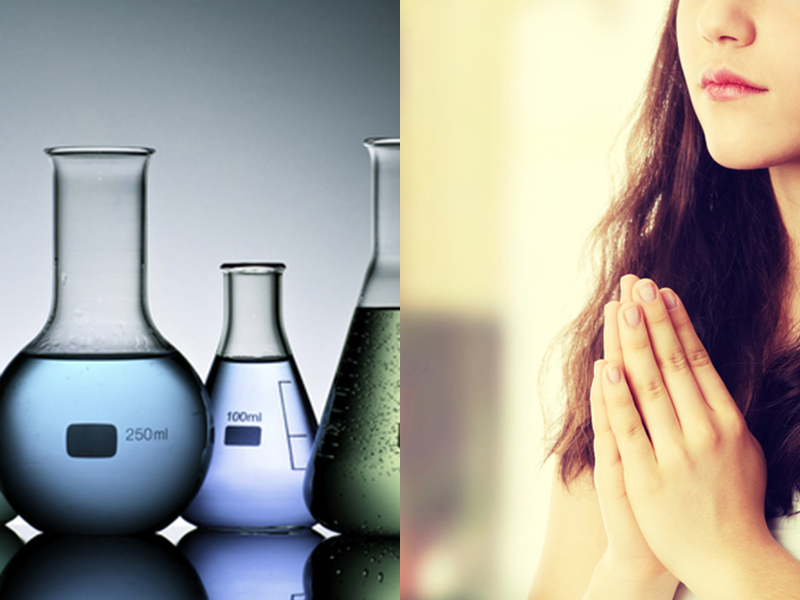(RNS) — As public health officials grapple with the slowing rate of COVID-19 vaccinations in the U.S., two groups of Americans stand out as being particularly resistant to rolling up their sleeves for the shots: Republicans and white evangelicals.
In mid-April, about 20% of white evangelicals said they would “definitely not” get the shot, compared with 13% of all Americans, according to a Kaiser Family Foundation survey. About 20% of Republican respondents said the same.
Given the increasing overlap between the two groups, it is reasonable to assume that evangelicals’ religious beliefs are driving Republicans’ statistical resistance, as well. Certainly, religious beliefs — about the end times and God’s power to heal — may be fueling some of this skepticism, but there’s much more to the story.
RELATED: The path to herd immunity runs through America’s faith communities
Sociological research has shown that the way Americans think about the relationship between science and religion has changed drastically over the past few decades. The chasm that appears to exist today between these two sources of cultural authority wasn’t as wide in the past. And a bird’s eye view of history may offer some hope that bridge building is possible.
In 1972, researchers for the General Social Survey, working with the National Opinion Research Center at the University of Chicago, began measuring how confident Americans felt in the people leading certain key cultural institutions. Since then they’ve occasionally asked Americans to rate how confident they felt in the people leading the scientific community and organized religions.
Timothy O’Brien, a sociologist at the University of Wisconsin-Milwaukee, and Shiri Noy, an assistant professor at Denison University’s anthropology and sociology department, pored through 30 waves of the GSS to track how these attitudes have changed over time. The researchers found that in the 1970s, Republicans were more likely to place their confidence in science than religion, while the opposite was true of Democrats.
By 2018, these attitudes had completely reversed.
White evangelicals played an important role in this switch as they migrated into the Republican party. But even after excluding white conservatives from the dataset and controlling for beliefs about the Bible, O’Brien and Noy found that the same patterns still held. Compared with Democrats, even secular, religiously unaffiliated Republicans have become more closely aligned with religion over time.
As science became more politicized, O’Brien and Noy said, it was no longer seen as neutral, but as progressive. The politicization of religion also changed faith’s cultural association with piety to a link to conservatism. Both science and religions were recast as alternative, even opposing, sources of knowledge, values and authority.
“Religion has taken on a meaning such that even nonreligious people affiliate with it, because that meaning has become politicized,” O’Brien said.
Noy suggested that the GSS data debunks the popular notion that people who espouse “traditional family” values are also confident in religion, mistrusting of science and identify as Republican. The GOP hasn’t always viewed the scientific community with suspicion, she said, pointing to how Republican presidents formed science advisory committees in the past to help promote national interests.
“We, of course, live in our moment and think, of course, Republicans are going to be skeptical of the vaccine. But in fact we have no reason to believe that needs to be the case,” Noy said. “If we look at the data over time and in other countries, there’s no natural fit there; it’s just how things have progressed for a variety of reasons — political alliances, cultural context and international context.”
Business interests had a profound impact on the politicization of religion and science, the researchers said. As social movements highlighting the concerns of workers, consumers and the environment emerged in the 1970s, government regulatory agencies grew increasingly dependent on scientists as advisers. Large corporations reacted by calling for deregulation, often pushing aside the science.
At the same time, conservative ideology was being influenced by a widespread anti-intellectual movement that normalized contempt for scientists and others seen as cultural elites. All of these elements coalesced in the Republican Party, redefining in part what it meant to be conservative.
Over the same period, scientists themselves became more politically active and organized, often siding with liberal defense, environmental and economic policies. This enhanced the public’s image of science as a liberal institution.
Nevertheless, international surveys of scientists suggest that most scientists, including in the U.S., don’t see science and religion as opposing forces, but as independent spheres of reality that offer different ways of observing the world. In places such as Italy, India, Turkey and Taiwan, over 50% of scientists identify as at least slightly religious. Even in the U.S., about 30% of scientists claim to be at least slightly religious, with about 10% saying they have no doubt that God exists.

Basic forms of science like refrigeration aren’t the ones in question. It is larger ideas like, for example, the existence of a divine creator that spark conversation. Image by Tomislav Kaučić courtesy of Pixabay/Creative Commons
Meanwhile, the loudest voices in the American scientific community are those who present religion and science as being inherently incompatible, according to Elaine Ecklund, a sociologist and director of the Religion and Public Life Program at Rice University.
But it is only certain branches of science that seem to impinge on core religious beliefs, such as the existence of a divine creator, that rile the American public, Ecklund pointed out: No one is protesting the science that led to, say, refrigeration. It is when scientists disparage beliefs that people’s lived experiences have shown to be true that it breeds suspicion.
“That’s made the general public think of the scientific community as very inaccessible, very authoritarian, and it’s led to significant mistrust,” Ecklund said.
The science-faith divide between Democrats and Republicans appears to have deepened during the coronavirus pandemic, according to a Pew Research Center survey published last May. About 53% of respondents who were Democrats or leaned Democrat said they had a “great deal” of confidence in medical scientists to act in the public interest, an increase of 16 percentage points compared with the previous year. During that same period, Republicans’ trust in medical scientists remained roughly the same (about 31%).
Republican-leaning respondents’ views overlapped closely with those of white evangelical Protestants. About 31% of white evangelicals said they had a great deal of confidence in medical scientists to act in the best interests of the public — a lower percentage than white nonevangelical Protestants, Catholics, the religiously unaffiliated and even Black Protestants, a group whose relationship with the scientific community has been marred by historic inequities.
White evangelicals’ confidence in scientists as a whole was even lower. Only 25% of this religious group said they had a great deal of trust in scientists in general.
“Science and a mistrust of scientists as people has come to be bundled with a Republicanism and a form of evangelical Christianity, for some,” Ecklund said. “The trick is how do we delink those things. How do we say that you can be a Republican or conservative Christian and it doesn’t mean necessarily that you need to mistrust scientists?”
The answer may be faith itself.

The Rev. Patricia Hailes Fears, pastor of the Fellowship Baptist Church in Washington, receives the Johnson & Johnson COVID-19 vaccine during a gathering of a group of interfaith clergy members, community leaders and officials at the Washington National Cathedral, to encourage faith communities to get the COVID-19 vaccine, March 16, 2021, in Washington. Photo by Danielle E. Thomas/Washington National Cathedral
Many communities have looked to clergy to vouch for the safety of the vaccine, but Ecklund said her own research is starting to show that some clergy are fearful that coming out in favor of science or of vaccine efforts will lead to political divisions in their congregations. Yet, according to an April study from PRRI and Interfaith Youth Core, nearly half (47%) of vaccine-hesitant white evangelicals who regularly attend church say that they’d be more likely to get vaccinated if a religious leader or fellow church member encouraged it, got a vaccine, or if their church was a vaccination site.
RELATED: Franklin Graham urges evangelicals to get vaccinated before it’s ‘too late’
Along with religious leaders, Ecklund said, the “everyday scientists sitting in the pews” will be vital bridge builders, since they speak the languages of science and religion and can serve as trusted interlocutors in white evangelical communities and also in faith communities of color. On a national level, she pointed to National Institutes of Health chief Francis Collins, a rare outspoken Christian in science.
But fellow Christians who are scientists at a local church may be more powerful influences. “People really need to see people who look like them and hear people who believe like them in the scientific community,” said Ecklund. “People are more likely to trust people they know, especially in a time where we are just being inundated with information all the time. Relationships are extremely important.”
Ahead of the Trend is a collaborative effort between Religion News Service and the Association of Religion Data Archives made possible through the support of the John Templeton Foundation. See other Ahead of the Trend articles here.





